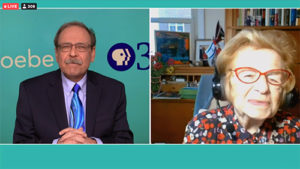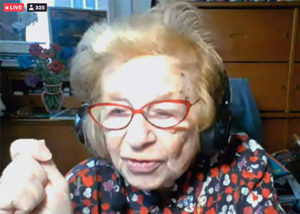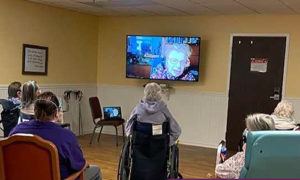‘Dr. Ruth’ Brings Stories and Solid Advice to Phoebe Institute on Aging’s Baby Boomers and Aging Conference

“I did not know that I was going to talk about sex all day … I did not know I was going to be ‘Dr. Ruth’ — but I love it!”
“Dr. Ruth” Westheimer — world-renowned sex therapist, author, lecturer, and professor — alternately shared anecdotes from her childhood and advice on sexuality for older adults, sprinkled liberally with humor and passion, in her keynote Q&A session for Phoebe Institute on Aging’s spring conference, held virtually March 18.
The conference, “Sex, Drugs, and Rock & Roll: Baby Boomers and Aging,” offered plenary sessions in the morning, culminating in “Dr. Ruth’s” keynote, and workshop tracks in the afternoon. But Westheimer was key to the conference’s focus.
“Dr. Ruth is a living legend,” said Stacey Projaska, executive director of Phoebe’s office of philanthropy. “When we first discussed the theme of how baby boomers are changing senior care, and decided to use ‘Sex, Drugs, and Rock & Roll’ in the title, she automatically came to mind.”
“She has devoted her life’s work to breaking down norms and freely discussing that had once been regarded as a taboo subject,” Projaska added. “Dr. Ruth’s influence in diffusing the anxiety and shame [often] associated with sex — particularly in older generations — cannot be overstated.”

Westheimer — who moved from Frankfurt, Germany, to Switzerland at age 10-1/2 to escape the Nazis and became an orphan when her family members were killed in the extermination camps — studied and taught psychology at the University of Paris. She immigrated to the United States and settled in Washington Heights, Manhattan, New York City. She subsequently earned an M.A. degree in sociology (1959) from The New School of Social Research and an Ed.D. degree from the Teachers College at Columbia University (1970). While preparing her dissertation, she discovered her future interest and career, switching from a paper on children who left Switzerland during the Nazi occupation and became orphans to data from Planned Parenthood on contraception.
The keynote session was led by Grover Silcox from PBS 39-WLVT, part of Lehigh Valley Public Media. PBS 39 partnered with Phoebe Ministries in the morning half of the conference, donating the studio space and technology to create, essentially, a live TV broadcast for the conference to stream. Westheimer, almost 93, set the tone of the session early.
“I’m going to get into trouble,” she told Silcox slyly. “I’m going to tell everybody at the conference that you are very handsome!”
In between such humorous moments, Westheimer gave some of her trademark advice, but focused on older adults. She shared tips for enjoying sexual activity for older adults, most of it quite practical. She encouraged single older adults who live alone to “listen to what Dr. Ruth says … use fantasy and keep your mouth shut.” For couples, she said, “Don’t engage in sex in the evening when you’re tired. Instead go back to bed after breakfast … don’t make it into a problem. Instead, say, ‘Thank God I can still feel it!’”
“Dr. Ruth” also was candid on how society has changed over the years, especially regarding sexuality, noting that “even PBS and Phoebe are willing to have Dr. Ruth talking about issues of sexuality. Many years ago, that would not have happened.”
“These days,” she added, “everybody has to be sexually literate.”
But Westheimer also focused on the mental health aspect of older adults, knowing that some Phoebe residents were watching the keynote from their communities’ public spaces. The virtual nature of the conference enabled Dr. Ruth to speak directly to the residents who were watching the session. Her advice for both older adults and the baby boomers about to enter Phoebe Ministries communities concentrated on dealing with the current pandemic.
“Instead of wasting good emotions and time on moaning that you are alone and have to stay home … do something that makes you smile,” she said. “When you think of somebody you want to call — maybe somebody you haven’t talked to in months — call them! And don’t talk about your loneliness. Talk about what you are going to do when this pandemic is over.”
Dr. Ruth used the analogy of being an avid skier who can no longer ski. “Admit that you’re getting older,” she said. “You have to be grateful for whatever you can do that is helpful to you. Don’t dwell on the things you can’t do anymore. … Just like complaining about what you can’t do bores you, you bore others when you complain!”
She encouraged Phoebe residents to record their thoughts and stories, either via video, audio recording, or in writing. Writing about their feelings and sharing stories about their lives is good for the residents themselves, she said, but also will be cherished by family members in generations to come. But “don’t block out the sad parts of your life — you have to acknowledge them,” she said.

The residents from Phoebe Richland in Richlandtown, Pa., enjoyed Westheimer’s presentation. “I love that she still comes at life so full of fun at 92 years old!” said one resident. “I enjoyed watching her flirt with the host, Grover,” another remarked. “It was a real treat to see her live” was a comment repeated by many Phoebe Richland residents.
Dr. Ruth “has helped thousands of people feel comfortable with their sexuality,” said Projaska. “Now that she is a senior herself, living through a time of isolation, she is helping seniors and their caregivers understand the need for connection and intimacy at any age.”
Conference Segments Built Upon Each Other
The virtual conference caused attendance records to shatter. “We reached 500 registrants for the first time,” said Projaska. “Additionally, this is the first time people registered from out of state, including New Hampshire, Florida, Missouri, and Texas.”
Prior to Westheimer’s keynote, attendees watched “The Boomer’s Guide to Growing Older,” a video produced by KVIE PBS in Sacramento, Calif. They then heard two presentations: “Boom Times: From War Babies to Grandboomers,” from James A. Von Schilling, Ph.D., professor of English and humanities coordinator at Northampton Community College in Bethlehem, Pa.; and a panel on older adults in Pennsylvania that included a presentation from Robert Torres, secretary of the Pennsylvania Department of Aging.
The afternoon workshops were split into three tracks, but participants could attend any of the sessions. Topics ranged from the science of sexuality and aging to medical cannabis; from music therapy among dementia patients to family connections in aging. The presentations touched on such areas as substance abuse among baby boomers, sexual orientation, and how to combat agism.
The conference received rave reviews from the participants. “For me, the topics [kept] enhancing the previous presenter,” said one. “From a family affair to rethinking how we speak of those with more years than ourselves … the topics meshed well together to paint a mosaic of understanding for those who have traveled this world for a while.”
“Excellent ideas and steps to have the life — and death — you want on your own terms,” said another.
“I appreciate the topic and subtopics discussed, because sexuality is often a taboo subject, especially for older adults,” a third attendee remarked, “but it is so important to discuss and understand the complexities. I love that there were so many different presenters and disciplines represented.”
The necessity of the virtual conference, thanks to COVID 19, jump started an idea Phoebe Institute on Aging board members had already been discussing.
“The Phoebe Institute on Aging Advisory Board has been discussing a virtual component to our conferences for the past couple of years,” said Projaska. “We know that many caregivers of older adults — whether professionals or family members — are unable to leave their jobs or their loved ones unattended to participate in an all-day conference. I foresee that future conferences will likely contain a virtual component.”
That would be fitting for Dr. Ruth. “Try something,” she said. “If it doesn’t work, don’t waste time worrying about it. Rather, say ‘OK, what am I going to do next?’”
Learn more about Phoebe Ministries.
Join Our Mailing LIst
"*" indicates required fields
Follow on Facebook
Bethany Children’s Home Hosts Annual Summer Concert Series with Unique Fundraising Twist - CHHSM
www.chhsm.org
Bethany Children’s Home in Womelsdorf, Pa., is hosting its annual Summer Concert Series, but this time with a special mission in mind: all proceeds will help build a new outdoor recreational complex...